EAPIL Conference in Geneva from 18-20 June 2026: Registration open!
/0 Comments/in News/by Giesela Ruehl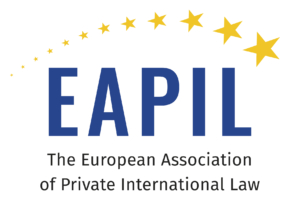 From 18 to 20 June 2026 the European Association of Private International Law (EAPIL) will host its third biannual conference. Following the Association’s conferences in Aarhus (Denmark) and Wroclaw (Poland) the conference promises to be a key event for scholars and practitioners interested in the present and future of European private international law.
From 18 to 20 June 2026 the European Association of Private International Law (EAPIL) will host its third biannual conference. Following the Association’s conferences in Aarhus (Denmark) and Wroclaw (Poland) the conference promises to be a key event for scholars and practitioners interested in the present and future of European private international law.
Programme and Audience
Under the title “Shaping the Future of Private International Law in Europe – Putting Together the Pieces & Filling Gaps”, the conference will address structural developments, unresolved issues, and emerging challenges in European private international law. Special emphasis will be placed on 1) the consolidation of European private international law in a single instrument (EuPIL Act), 2) the unification of international property law (including the protection of cultural objects), and 3) the relationship of European Private International Law with third States.
All topics will be addressed from an analytical and a forward-looking perspective, combining doctrinal reflection with policy-oriented debate. Contributions will come from an internationally diverse group of speakers, reflecting EAPIL’s commitment to comparative and transnational perspectives.
The conference is open to academics, judges, practitioners, policymakers, and early-career researchers with an interest in (European) private international law.
Venue and Organisation
Hosted by the Faculty of Law of the University of Geneva, the conference will take place exclusively in person in Geneva. The choice of venue underscores the international outlook of the event and provides an ideal setting for scholarly exchange and networking.
Registration
Registration is available here. An early-bird rate applies until 15 March 2026, with standard registration available until 17 May 2026. Participation fees vary depending on registration date and include the option to attend the conference dinner. Further details on fees and registration can be found on the conference website.
Why Attend?
The EAPIL Conference 2026 offers a unique opportunity to:
- engage with cutting-edge research in private international law,
- discuss current reform projects and unresolved doctrinal questions,
- connect with leading scholars and practitioners from across jurisdictions, and
- contribute to shaping the future development of the field.
Further Information
More information on the programme, registration, and practical details is available on the conference website.
About EAPIL
The European Association of Private International Law was founded in 2019 to promote the study and development of Private International Law. It has today more than 600 members from more than 70 countries. For more information visit the EAPIL website and follow the EAPIL blog.
Crossroads in Private International Law Webinar with Tobias Lutzi on “Crossroads in Private International Law Seminar on the Reform of EU Private International Law” at the University of Aberdeen
/0 Comments/in News/by CoL .netThe Centre for Private International Law & Transnational Governance of the University of Aberdeen is continuing its Crossroads in Private International Law webinar series with a talk by Tobias Lutzi (University of Augsburg) titled ‘Between Ambition and Realism – What to Expect from the Upcoming Reforms to the Rome II and Brussels Ia Regulation?’: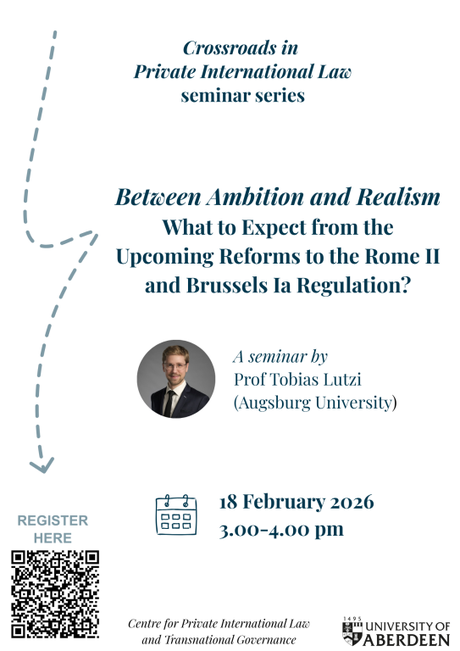
The Centre for Private International Law & Transnational Governance invites you to attend the next seminar in our Crossroads in Private International Law seminar series. You can find the link to register at the bottom of this page.
Prof Tobias Lutzi (Junior Professor for Private Law at Augsburg University) will give a seminar on the reforms to the Rome II and Brussels Ia Regulation. Prof Lutzi has kindly provided the following abstract:
Last year, the EU Commission formally kicked off the process of reforming two key instruments of EU Private International Law, identifying potential areas for reform and setting out some overarching policy goals. In 2026, the Commission will face the more difficult decision of which of those areas to actually focus on. This talk will discuss the respective merits of those areas of reform, highlighting the tension between ambition and realism that will shape the Commission’s work.
We are looking forward to welcoming you online or on campus!
Additional information and the link to register can be found here.
Revue critique de droit international privé – Issue 2025/4
/0 Comments/in News/by Etienne FarnouxWritten by Hadrien Pauchard (assistant researcher and doctoral student at Sciences Po Law School)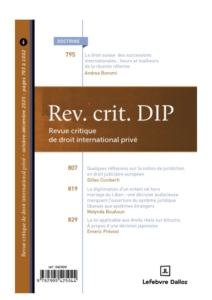
The fourth and last issue of the Revue Critique de droit international privé of 2025 has just been released. It contains four articles, eight case notes, and six book reviews. In line with the Revue Critique’s policy, the doctrinal part will soon be made available in English on the editor’s website (for registered users and institutions). Read more
Conflict of laws in the South African courts: an(other) recent missed opportunity
/4 Comments/in Views, News/by Saloni KhanderiaPosted on behalf of Jason Mitchell, barrister at Maitland Chambers in London and at Group 621 in Johannesburg.
An Australian, Hannon, wants to book a Southern African safari with his partner, Murti, as a surprise birthday gift. He sees one he likes on an Australian travel website. Hannon fills in the online form.
It turns out that the website is just the agent for a South African company, Drifters Adventours. Drifters emailed Hannon the price and payment details. Attached to the email is a brochure. The brochure says, “Drifters do not accept responsibility for any loss, injury, damage, accident, fatality, delay or inconvenience experienced while on tour.” The brochure also says, “You will be required to complete and sign a full indemnity prior to your tour departure.” Read more
Part 4 of the Juridical Review for 2025
/in News/by Mukarrum AhmedThe recently published Part 4 of the Juridical Review for 2025 contains articles based on the International Perspectives on Scots Law seminar series held at the University of Stirling during 2023/2024. Some of these articles will be of interest to private international law aficionados:
‘The Pre-enactment Legislative Review Process in Scotland’ by Robert Brett Taylor and Adelyn L.M. Wilson (University of Strathclyde);
‘Taking the Transnational Nature of the UK Competition Appeal Tribunal Seriously: A Private International Law Perspective’ by Mihail Danov (University of Exeter);
‘The Evolution of Business and Human Rights Litigation against Multinational Companies’ by Mukarrum Ahmed (University of Lancaster);
‘Parties’ Intention and the Future Internationalisation of Scottish Arbitration – A Review of Scottish cases post 2010′ by Hong-Lin Yu (University of Stirling);
‘The Art of Persuasion: Embracing the Auld enemy and Beyond’ by Dr Mo Egan (University of Stirling).
JLMI – Call for Papers – Issue no. 3/2026
/in News/by CoL .netThe following information was kindly shared with us by the editors of the JLMI.
The Journal of Law, Market & Innovation (JLMI) welcomes submissions for its third issue of 2025.
The Call for Papers for this 3rd issue is devoted to Digital markets, consumer autonomy and consumer welfare.
You can find the call with all the details at the following link:
Digital markets, consumer autonomy and consumer welfare
Prospective articles should be submitted in the form of abstract (around 800 words) or draft articles to submissions.jlmi@iuse.it within 25 february 2026. The publication of the issue is set for the end of November 2026.
For further information, or for consultation on a potential submission, you can contact us by email at editors.jlmi@iuse.it.
Visit our website to read the full announcement.
Hague Academy Collected Courses published in 2025
/in News/by CoL .netThe following information was kindly shared with us by De Gryuter Brill.
The Hague Academy is a renowned international institution dedicated to the study and teaching of public and private international law. Supported and recognized by the United Nations, the Academy aims to foster rigorous and impartial analysis of legal issues arising from international relations. Its courses address both theoretical and practical dimensions of international law, including legislation and case law. In principle, all courses are published in the Collected Courses of The Hague Academy of International Law in the language in which they were originally delivered. The courses on private international law that were published in 2025 are:
- Volume 451: Garcimartin, F.: Responses to a Legally Fragmented World: A Private Law Perspective (General Course of Private International Law)
- Volume 449: Esplugues, C.: New Dimensions in the Application of Foreign Law by Courts (and Arbitrators) and Non-Judicial Authorities
- Volume 446: Dickinson, A.: Natural Justice in Recognition and Enforcement of Foreign Judgments
- Volume 446: McLachlan, C.: On the Interface Between Public and Private International Law (General Course on International Law)
- Volume 445: Rodríguez Benot, A.: Le régime économique des couples en droit international privé
For a full listing, including the courses on public international law and international arbitration, please visit The Hague Academy Collected Courses Online / Recueil des cours de l’Académie de La Haye en ligne.
Virtual Workshop (in English) on February 3, 2026: Stellina Jolly on “Forging a Path for Climate Justice: Integrating Public and Private International Law in Transboundary Litigation in India”
/in News/by Ralf Michaels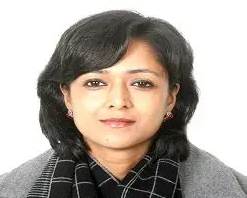
On Tuesday, February 3, 2026, the Hamburg Max Planck Institute will host its monthly virtual workshop Current Research in Private International Law at 11:00 a.m. – 12:30 p.m. (CEST). Stellina Jolly (South Asian University) will speak, in English, about the topic
“Forging a Path for Climate Justice: Integrating Public and Private International Law in Transboundary Litigation in India”
Cross-border climate litigation, gaining traction globally, requires active engagement with private international law for effective dispute adjudication. Although Indian climate jurisprudence has not yet substantively addressed cross-border disputes, emerging trends suggest that this scenario may soon evolve. The talk analyses three plausible litigation scenarios involving Indian and foreign parties to assess the readiness of Indian private international law in addressing transboundary climate harm. Firstly, Indian plaintiffs filing cases in foreign jurisdictions against transnational corporations headquartered abroad, alleging climate-related harm caused within India; secondly, foreign plaintiffs filing cases before Indian courts for the harm caused by Indian transnational corporations in their jurisdictions; thirdly, foreign plaintiffs filing cases before Indian courts for the transboundary harm caused by Indian companies as a result of their Greenhouse gas (GHG) emissions. The talk evaluates the adequacy of Indian private international law in addressing cross-border climate cases and proposes incorporating environmental and human rights considerations in the determination of choice of law.
The presentation will be followed by open discussion. All are welcome. More information and sign-up here.
If you want to be invited to these events in the future, please write to veranstaltungen@mpipriv.de.
New Book: La circolazione dello statuto personale / La circulation du statut personnel
/in News/by Giesela Ruehl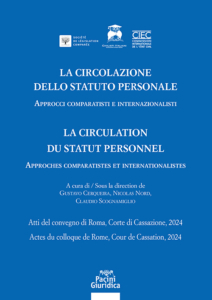 A new collective volume entitled “La circolazione dello statuto personale / La circulation du statut personnel” has recently been published by Pacini Giuridica. Edited by Gustavo Cerqueira (Nice), Nicolas Nord (Strasbourg) and Claudio Scognamiglio (Rome), the book brings together the proceedings of an international conference held on 19 January 2024 in Rome, in the prestigious Giallombardo Hall of the Italian Court of Cassation. Read more
A new collective volume entitled “La circolazione dello statuto personale / La circulation du statut personnel” has recently been published by Pacini Giuridica. Edited by Gustavo Cerqueira (Nice), Nicolas Nord (Strasbourg) and Claudio Scognamiglio (Rome), the book brings together the proceedings of an international conference held on 19 January 2024 in Rome, in the prestigious Giallombardo Hall of the Italian Court of Cassation. Read more
